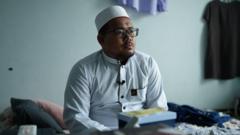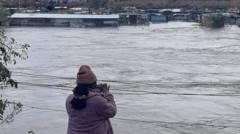Soe Nay Oo mourns the loss of his former congregation members after a devastating earthquake struck near Sagaing, Myanmar, as he navigates survivor's guilt and aids rescue efforts from Thailand.
Heartbreak in the Wake of Myanmar's Earthquake: A Community's Tragic Loss

Heartbreak in the Wake of Myanmar's Earthquake: A Community's Tragic Loss
A former imam's grief reveals the devastating impact of the earthquake that claimed 170 lives in Myanmar.
The call to prayer resonated through Sagaing, Myanmar, last Friday, as hundreds of Muslims prepared for their last Friday prayers of Ramadan, with Eid just days away. Tragically, at 12:51 local time (06:21 GMT), a powerful earthquake struck the region, resulting in the collapse of three mosques, including the Myoma, claiming nearly all lives within.
Soe Nay Oo, a former imam of the Myoma mosque, now residing in Mae Sot, Thailand after fleeing the 2021 coup, felt the tremor from afar. In days that followed, he learned that approximately 170 of his relatives, friends, and former congregation members perished in the disaster, most of them while praying. "I can't hold back my tears when I talk about this," he said, grappling with the grief for those lost.
The quake, which has reportedly caused the deaths of over 2,700 people, primarily struck near Sagaing and Mandalay. As the situation develops, rescuers continue to find bodies among the rubble. The Muslim community endured a severe blow, with estimates suggesting that about 500 Muslims died during prayer. Eyewitness accounts reveal Myoma Street as the most affected area, where numerous homes also crumbled.
Survivors are now without shelter, compelled to stay close to the roads for fear of aftershocks, and facing shortages of food. Reports indicate that many worshippers attempted to escape before the buildings fell, and Soe Nay Oo recounted heart-wrenching anecdotes of those who succumbed in their efforts to save one another.
Among the deceased was a beloved cousin of his wife, whose loss Soe Nay Oo described as the most painful moment in his life as an imam. He spoke tenderly of a well-respected businessman who treated him like family and a former assistant imam known for his dedication. Each announcement of another loss sends waves of grief through him, "I feel devastated… memories I cherish of them flood back."
The tragedy's timing during Ramadan amplifies his pain. "They have returned to Allah's home… they are martyrs," he remarked. Amidst the chaos, the Muslim community faces significant challenges in managing their dead due to conflicts between the military junta and resistance forces, complicating burial efforts.
Soe Nay Oo's community is now required to transport their loved ones to Mandalay due to a closure on a local cemetery, further delaying burials that should follow Islamic tradition. "It is the saddest thing… we cannot bury our families ourselves," he lamented.
The survivors, even while reeling from their trauma, are actively aiding rescue efforts. "They couldn't even describe their loss when I speak to them," Soe Nay Oo added, conveying the profound sorrow shared.
Feeling disconnected from his former congregation and grappling with survivor's guilt, Soe Nay Oo expressed the longing to be in Myanmar during the quake. "If I were the imam still… I would have gone with them—this painful thought torments me," he admitted, tears welling as he reflected on the sleepless nights filled with worry for his family members still unaccounted for.
Currently, he has paused his human rights work to focus on coordinating rescue operations, reaching out to fellow Muslims for assistance. “I feel relief whenever I can help,” he stated, finding purpose amid the grief. As the community continues to face immense challenges, Soe Nay Oo remains determined to support those in need as they navigate the overwhelming aftermath of the devastating earthquake.






















